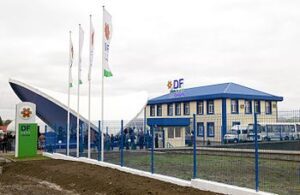
IAEA Director General Rafael Mariano Grossi called Wednesday meetings with high-ranking representatives of the Ukrainian government at the South Ukrainian NPP (SUNPP) very productive and announced the imminent arrival of experts at Ukrainian nuclear facilities.
“Teams of experts and additional safety equipment will arrive at Ukraine’s nuclear facilities very soon,” he tweeted at the end of the day.
The daily report of the organization indicates that at meetings with the Minister of Energy of Ukraine German Galushchenko, the heads of the nuclear regulator of Ukraine SNRIU Oleg Korikov and NNEGC “Energoatom” Petr Kotin, as well as the director of the South Ukraine NPP Igor Polovich, specific steps were considered to provide urgent assistance to Ukraine in protecting its nuclear facilities.
As reported, on March 30, Grossi visited South Ukraine NPP, where he met with representatives of the Ukrainian side. At a meeting with plant workers, he noted that the issue of the withdrawal of Russian troops from the Chernobyl and Zaporizhzhya NPPs “needs to be considered at different levels,” and it depends on the ceasefire agreements.

The German truck and bus manufacturer MAN was forced to send about 11,000 employees on unpaid leave due to the Russian military invasion of Ukraine.
The Volkswagen Group-owned company said on Wednesday that its facilities in Munich and Krakow, Poland, have been halted since March 14 due to the cessation of supplies of electrical wires produced at Ukrainian factories. At three other MAN sites, production volumes have been reduced, including at the engine plant in Nuremberg.
“Suppliers of electrical wiring for trucks cannot produce it at Ukrainian enterprises or can produce it in very limited quantities,” MAN said in a statement. “As a result, we could lose production for several weeks, which will sharply reduce output figures in the second quarter.”
The company said it has already started looking for additional sources of truck wiring harnesses in other countries.
“However, this will take several months,” said Alexander Vlaskamp, chief executive officer of MAN.
The company notes that its employees will be transferred to a reduced working hours scheme, in which MAN compensates them for 80% of lost income from both its own and state funds.
The problems of Ukrainian suppliers previously led to disruptions in the work of Volkswagen and BMW enterprises.
Most of the Ukrainian enterprises for the production of electrical wiring, located in the western part of the country, have resumed work, the Financial Times newspaper writes, citing representatives of several enterprises.
Thus, the German Leoni, which owns two factories in the west of Ukraine, has already reported that both of its enterprises have returned to work.
Other companies, including Aptiv and Kromberg & Schubert, have resumed production, FT sources say.
COMPONENTS, EUROPE, FACTORIES, MAN, MANUFACTURER, TRUCK, UKRAINE

For the second month in our country there is a war. Millions of Ukrainians have become refugees, and the country’s largest cities have become a zone of active hostilities. In this situation, many families have been separated, people often lose contact with their closest relatives.

A team of journalists and media workers put forward an initiative to create a project to search for missing people “Find loved ones”.
We ask citizens whose relatives do not get in touch to send us all the information they have. We recommend using the following form:
1. Full name of the missing person;
2. Your contact details;
3. Photo of the missing person, description of special features;
4. Approximate place of the last stay of the missing person.
The project is non-commercial, all your appeals will be edited and published free of charge in the media.
We invite colleagues from the media to join the initiative!
The project coordinator is Maksim Urakin, deputy head of the Interfax-Ukraine news agency and publisher of the Open4Business project.
Please send information about the missing to e-mail maksim.urakin@gmail.com

The head of the Ukrainian delegation at the talks with the Russian Federation, David Arakhamia, considers the role of the Russian oligarch Roman Abramovich in this process to be positive, since he initially acted as an “unofficial channel of communication.”
“In fact, to be honest, he plays a very positive role. But I don’t understand why he began to play a public role. Because from the very beginning he had such a role that in negotiations it is called back channel, that is, an additional communication channel, unofficial , which helps to say some complex things in normal human language, and not in diplomatic – what they cannot say officially. Then, thanks to the international press, this hidden channel became known to the whole world in fact. As far as I understand the position, it is no longer hidden and is no longer a back channel, but is another face in the negotiations,” he said in an interview on the air of the national telethon.
Arakhamia believes that Abramovich is trying to position himself as a neutral party in the negotiation process.
“Although we do not perceive it as a neutral side. But, we can say that it is, of course, more neutral than the official side of the negotiations,” the head of the Ukrainian delegation added.

Two citizens of Ukraine were killed in a terrorist attack in the Israeli city of Bnei Brak on March 29, Spokesman for the Ukrainian Foreign Ministry Oleh Nikolenko has said.
“Ukrainians lived in Israel for a long time, both residents of Chernivtsi region. The Embassy of Ukraine is currently taking measures to inform the relatives of the victims and provide them with consular assistance, and also interacting with the police as part of the investigation of the terrorist attack,” Nikolenko told Interfax-Ukraine on Wednesday.

The current surplus of nitrogen fertilizers in the Ukrainian market reaches about 200,000 tons, which indicates that the Ukrainian agro-industrial complex is fully supplied with them for the spring sowing campaign, Oleg Arestarkhov, head of corporate communications at Group DF, said in a comment to the Interfax-Ukraine agency.
“The issue with nitrogen fertilizers for Ukraine is completely closed. According to our estimates, as of March 30, their current surplus reaches about 200 thousand tons. There are significant reserves of fertilizers, and Ostchem continues to process all solvent requests from farmers and ship products without any problems,” Arestarkhov emphasized. .
According to him, the company closes the current demand for nitrogen fertilizers within the country.
“The only thing is that in some regions there are logistical problems with delivery due to hostilities,” said a representative of Group DF.
At the same time, he noted that supply chains are constantly being restored. “We are doing everything possible to completely update the logistics. Ukrzaliznytsia is helping us a lot, our logistics company (Nika Trans Logistics, part of Group DF – IF) is working, which delivers fertilizers, our Ukragro NPK warehouses are working,” he said. Arestarkhov.
He added that domestic Ukrainian consumers were and remain a priority, 95% of all fertilizers produced by Ostchem are shipped to the domestic market.
Commenting on the issue of exports, Arestarkhov noted that the government’s permission to export fertilizers in the amount of 70,000 tons per month will in no way affect the security of Ukrainian farmers on the part of the Ostchem holding. The head of corporate communications said that the export of fertilizers by the Black Sea is now impossible due to risks. “Road and rail transport will be the main ones, it is safer, although more expensive,” he said.
According to him, all Ukrainian companies, who wanted to, have already bought fertilizers. “We have not refused anyone. And now we are not refusing anyone. The strongest demand is for saltpeter and UAN. The volumes that we promised to ship to end consumers and contracted, we have shipped and are shipping. You see, now is a very responsible period for the country, and we are clearly aware that this is not just the fulfillment of the agreements concluded by Ostchem, this is a matter of Ukraine’s national food security,” summed up the representative of Group DF.
According to his estimates, the price of nitrogen fertilizers will not fall in the near future. “I don’t think there will be a fall in the near future, it’s unlikely. Rather, on the contrary. Although the winter period is over, the price of gas, which is the main raw material for the production of nitrogen fertilizers, for obvious reasons, remains too high at European hubs. Many factories in the world are stopped, and fertilizer producers that are working will not trade fertilizers at a loss, at a price below cost,” he explained.
Arestarkhov added that the balance between supply and demand is seriously disturbed in the world ammonia markets, and the problems affect not only nitrogen fertilizers, but also potash fertilizers, which are complex.
“The new price levels are something that many farmers are already accustomed to. It hurts businesses. Margins are falling for both fertilizer and agricultural producers. It will take time for global fertilizer markets to get out of the turbulence zone and return to a state of stability, balance and predictability Only peace and the solution of all geopolitical issues can stabilize the markets. Everything else is derivative,” the representative of Group DF emphasized.
Group DF is consolidating the assets of businessman Dmitry Firtash in the gas distribution, chemical, titanium and port industries, as well as in agriculture and media.
The nitrogen sub-holding of Ostchem includes Cherkasy Azot, Rivneazot, Severodonetsk Azot Association, as well as Stirol in the occupied Gorlovka (Donetsk region).